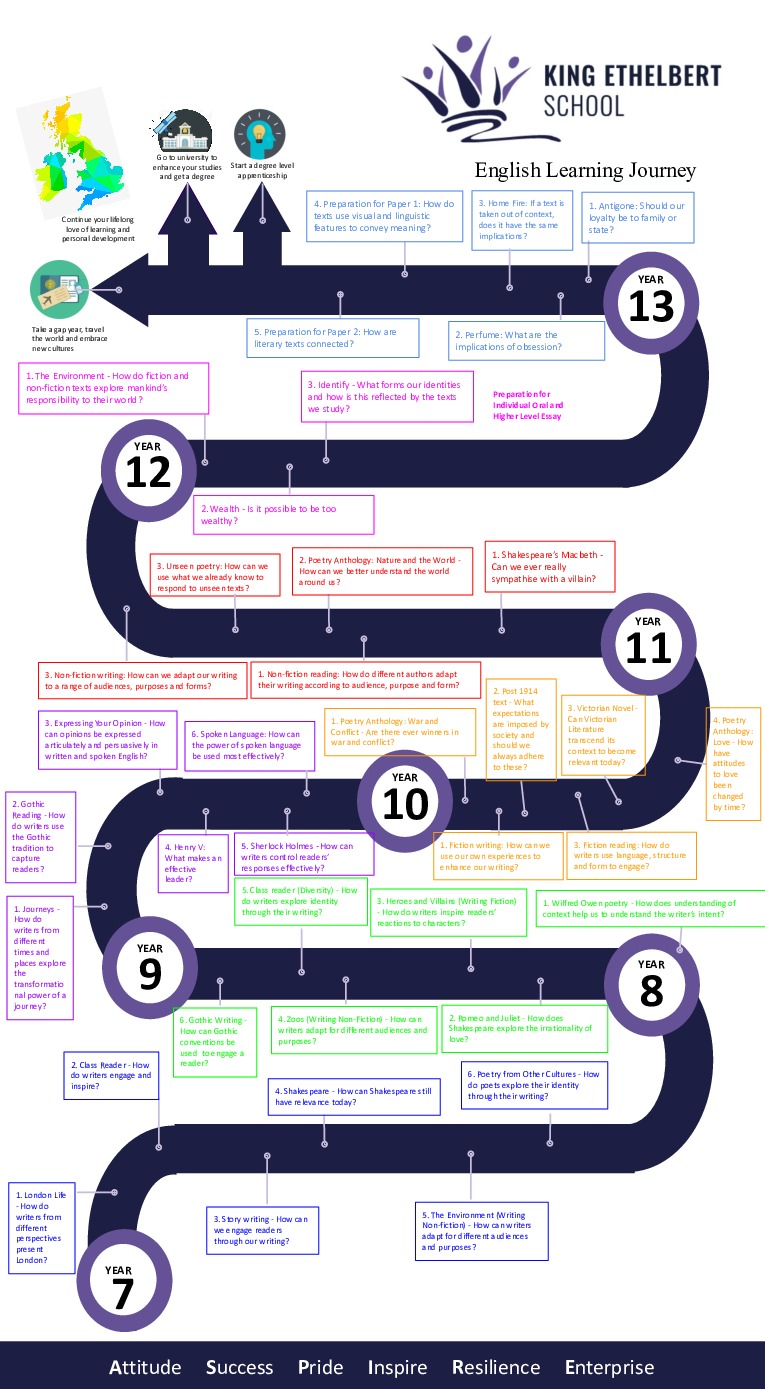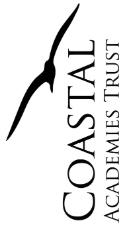- Home
- Curriculum
- Subject Information
- English
English
Curriculum Intent Statement
English at King Ethelbert aims to develop a breadth of knowledge and skills which both foster a love of English and prepare students for life beyond the classroom. The curriculum aims to be both culturally relevant, studying texts with links to the local area and which deal with issues our students are concerned by, and globally diverse, exploring texts and writers from across the world, from India to rural Ireland to Ancient Greece. This is achieved by delivering a knowledge rich curriculum which recognises the links between reading, writing, speaking and listening, and which aims to challenge all students to reach their potential in each of these areas.
|
Globally Diverse |
Ambitious for the Future |
Inquisitive Learners |
|
In English, we aim to develop an awareness of the wider value of English, demonstrating that the skills learnt are not just about assessment and passing exams, but about wider interests, passions and opportunities in a global society. We explore texts from a huge range of cultures and traditions. These include:
|
English lessons at King Ethelbert’s School:
|
The English curriculum is driven by inquiry. Lessons are often led by ‘big questions’ which will be discussed and returned to through a lesson and over the course of a term. We encourage students to consider alternative perspectives and viewpoints, and to ‘dig deeper’, beyond surface-level interpretations. We use Literature texts as a springboard to discuss moral dilemmas, such as how far should humans go in scientific experimentation through ‘The Strange Case of Dr Jekyll and Mr Hyde’, and whether humans are inherently evil through ‘Lord of the Flies’. Through this, we encourage our students to question their preconceived notions. |

Key Stage 3
Students study a broad range of texts, from the classics to the contemporary, which allows for a diverse curriculum, often raising important questions in life and moral debate while addressing significant historical, social and cultural issues. Areas covered include World War One literature, a unit based on ‘London Life’ which incorporates a range of poetry, non-fiction texts and the classical work of Dickens, and creative and non-fiction writing based on global issues. Students are encouraged to develop their cultural capital with wider reading, experience of live theatre through our affiliation with the Royal Shakespeare Company and the opportunity to have their work published as a result of the many poetry and creative writing competitions we offer. Students are expected to take pride in their work and, as such, all work is expected to be presented to their highest personal standard.
Students study a wide selection of text types to give them a strong foundation in understanding how language is crafted and utilised. They are given opportunities to develop and practise their writing, reading, and oral skills ready for the higher demands of key stages 4 and 5 and life beyond school. A range of non-fiction texts are also studied, preparing students for the practical application of English skills they will need across their lives, including letters, diaries, speeches, and newspapers. Students are encouraged to take an active role in independent learning through our setting of homework research tasks which prepare students for forthcoming lessons and provide context to many of the themes covered within a lesson. We encourage students to consider a range of issues affecting our global community, which include but are not limited to class, gender, animal rights, climate change and power and conflict. Raising these issues within the classroom facilitates respectful and reflective debate in a safe and nurtured environment where difference of opinion is conducive to a well-rounded discussion.
Key Stage 4
In key stage 4, students are taught both the GCSE English Language course and GCSE English Literature. Through English Literature we expose students to seminal works of English literature such as An Inspector Calls and A Christmas Carol which allows them to appreciate and evaluate the English literary canon in order to understand how ideas and attitudes have shifted across time. Students are also introduced to a wide variety of fiction and non-fiction texts through their GCSE English Language which encourages them to engage with the world around them. As teachers, we share our own literary interests with students to encourage them to take independent interest in reading and writing. Through studying a range of texts we expose students to ideas and values that will support their transition to independent adults. The curriculum covers topics such as conflict, power, gender, poverty, ambition, morality and other challenging ideas that create opportunities for debate and the sharing of opinions. We have high standards of literacy and continue to build on the skills developed at key stage 3, encouraging the use of tier three vocabulary, correct spelling and the use of ambitious and complex punctuation. Students are taught how to write in a variety of different styles (from both formal and informal letters to reviews and reports) with the intention that these skills are transferable into any line of work or further study they may wish to access in the future. We encourage the sharing and challenging of ideas in a safe and comfortable environment, with a particular focus on respecting the views of others. The literature texts studied open up challenging moral dilemmas and provide students with the opportunity to engage in debate and discuss the changing nature of society for either the better or the worse. High standards of work and presentation are encouraged throughout students’ studies to ensure they are able to use their work as a starting point for revision. As well as this, we encourage students to create their own revision resources and attend extra sessions in their own time to develop their initiative and independence.
Exam Board: WJEC Eduqas (English Language and English Literature)
Key Stage 5
For key stage 5 students are given the opportunity to continue their English studies through the IB English Language and Literature course. This course allows for a broad and diverse curriculum. Students are exposed to a range of non-literary text types (such as advertisements, cartoons and photographs) which are thought provoking and connect to their lived experience of the world. The themes covered through literary texts (such as A Streetcar Named Desire and Maus) often expose students to significant global historical, cultural and social themes. Students are encouraged to make connections with their own experience of the world and engagement is promoted by autonomy of choice e.g. allowing students to shape their own curriculum choices. We teach and promote high levels of communication skills, both across written and oral modes. Students are offered multiple opportunities to develop and test these skills; such as in the Individual Oral task and the Higher Level Essay. This provides excellent grounding for further education at university level, in any subject. We focus on developing knowledge of the world and empathy of a range of different cultural perspectives and viewpoints. One of the literary texts studied has to be a work in translation and is often transformational in terms of students’ understanding of the wider world around them. Through this students become more compassionate and understanding of the world around them. Students’ texts are often centred on ethical and moral issues and we teach students to use critical reading skills in order to understand and interpret these messages.
Exam Board: IB English Language and Literature
